In partnership with

Need a personal assistant? We do too, that’s why we use AI.
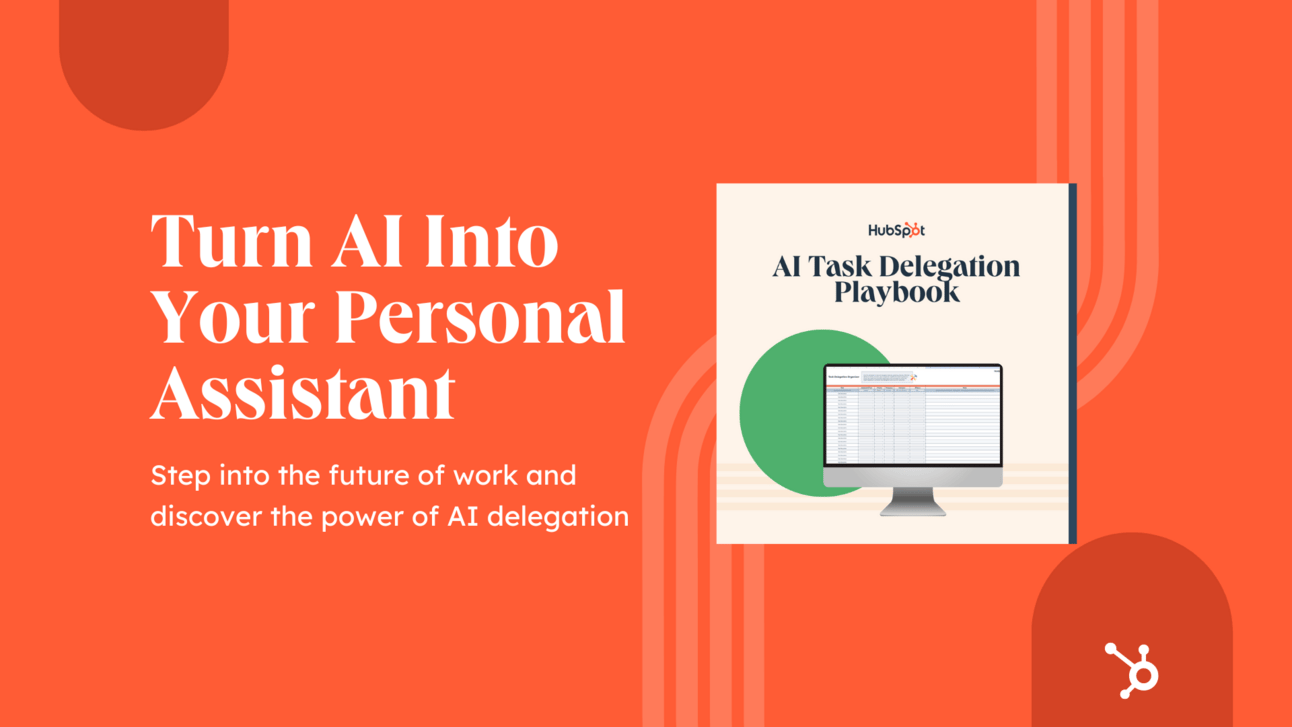
Ready to embrace a new era of task delegation?
HubSpot’s highly anticipated AI Task Delegation Playbook is your key to supercharging your productivity and saving precious time.
Learn how to integrate AI into your own processes, allowing you to optimize your time and resources, while maximizing your output with ease.
The future of luxury lies in craftsmanship.”
Fabrice Penot, Co-Founder of Le Labo
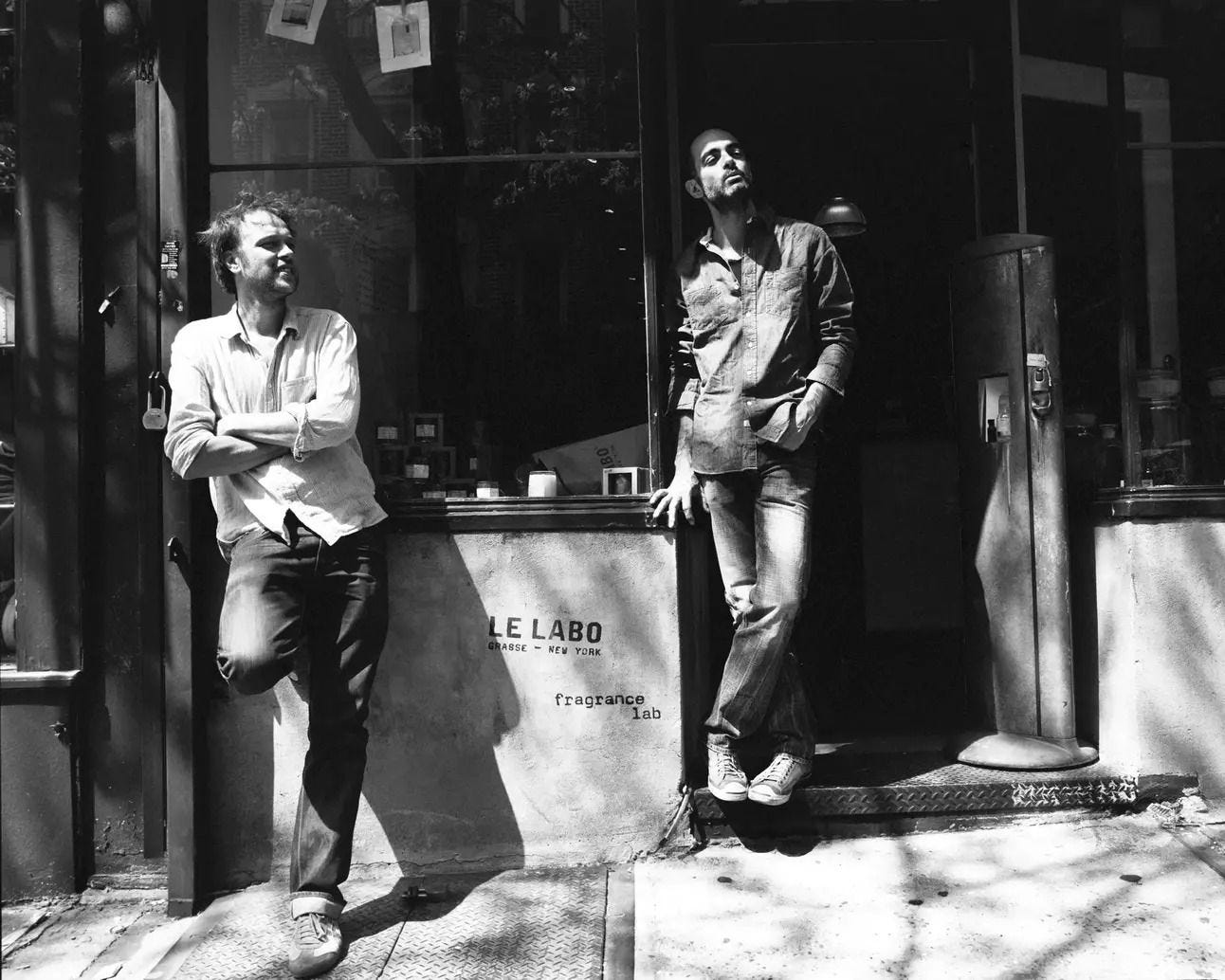
In 2006, two former L'Oreal executives made an audacious bet on an unassuming street in Nolita: they would build a luxury perfume brand by breaking every luxury perfume rule. No marble counters. No crystal bottles. No celebrity marketing. No wholesale distribution.
Instead, Fabrice Penot and Eddie Roschi opened Le Labo at 233 Elizabeth Street, which features exposed brick walls, concrete floors, and lab coat-wearing staff. Their manifesto was clear: "There are too many bottles of perfume and not enough soulful fragrances."
The idea probably seemed crazy to others. Luxury meant excess, perfection, and polish. Yet Le Labo bet on simplicity, imperfection, and raw authenticity. The result? They built a billion-dollar brand that was sold for $60 million.
This is the story of how breaking every industry rule created a new luxury category. It is also probably my favorite story so far. Le Labo’s history and principles resonate with me, and I hope they will with you as well.
The Cultural Timing
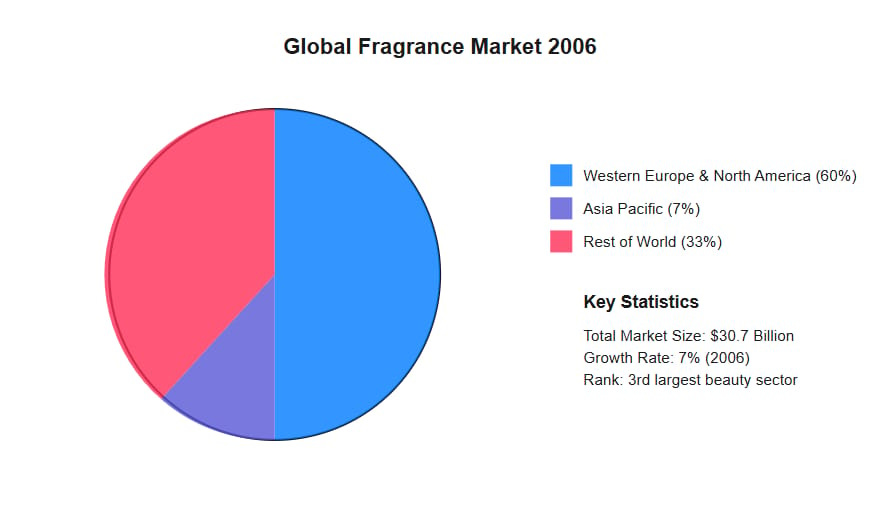
By 2006, the luxury perfume market had become formulaic. Every brand followed the same playbook: celebrity endorsements, heavy advertising, and mass distribution through department stores. Consumers found the same fragrances in LA, Tokyo, and Paris.
"We were fed up finding the same stores everywhere," Penot recalls. "We wanted to add a cultural experience that you would not find anywhere else."
The Anti-Luxury Strategy
Le Labo's approach was radical in its simplicity:
No fantasy names, just ingredients and numbers
Fresh blending in front of customers
Simple bottles with typewriter font labels
No PR or marketing spend
City-exclusive fragrances
"We may only address a small minority," Penot explains, "but those that do like our scent bond with them very closely." The result? 85% brand loyalty.
I love this approach, which was both this newsletter’s and my brand’s strategy - find a niche and crush it (we still have so much to do in the newsletter part, I know).

Premium Through Process
Instead of hiding perfume creation behind marble counters, Le Labo made it a theater. Each fragrance is hand-blended at the moment of purchase. The industrial aesthetic wasn't a design choice—it was a declaration that true luxury lies in craftsmanship, not packaging.
A) The Growth Strategy
Le Labo's unconventional growth path proved remarkably effective. Without formal investor backing or advertising, they expanded through pure product focus and word-of-mouth. "We had to put all our efforts into our product and trust that it would speak for itself," Penot notes.
The strategy worked. Lifestyle magazines and bloggers wrote enthusiastically about the fragrances. Premium hotels and retailers sought partnerships (I just saw that Singapore Airlines made a partnership with them). Le Labo became the antidote to mass luxury.
When Estée Lauder acquired the brand in 2014, they made an unusual promise: complete creative autonomy. "Creation is an autocracy, not a democracy," Roschi explains. "When you ask for opinions, your concept becomes diluted and the result is a mass product."
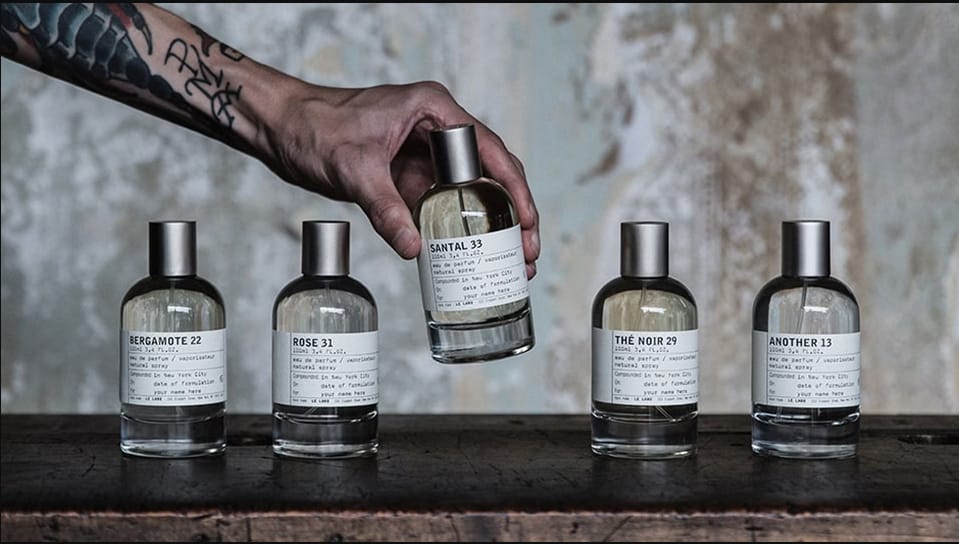
B) The Framework: Anti-Marketing Marketing
Le Labo's success offers a clear framework for premium brand building through strategic anti-marketing:
1. Process as Premium
Make creation visible
In-store blending stations
Lab coat-wearing staff
Transparent production
Turn craft into theater
Personal mixing ritual
Custom labeling
Date stamping
Educate customers
Ingredient knowledge
Perfume construction
Scent education
2. Scarcity by Design
Limited Distribution
Selective store locations
No wholesale channels
No department stores
Geographic Exclusivity
City-specific scents
Location-based releases
Cultural connection
Fresh Production
Made-to-order blending
Small batch creation
Expiration dates
3. Cultural Over Commercial
Local Integration
Neighborhood selection
Cultural alignment
Community presence
Experience Design
Industrial aesthetic
Minimal branding
Craft focus
Organic Growth
No advertising
Word-of-mouth
Natural advocacy
This framework works because it creates desire through constraint rather than promotion. Each element reinforces the others:
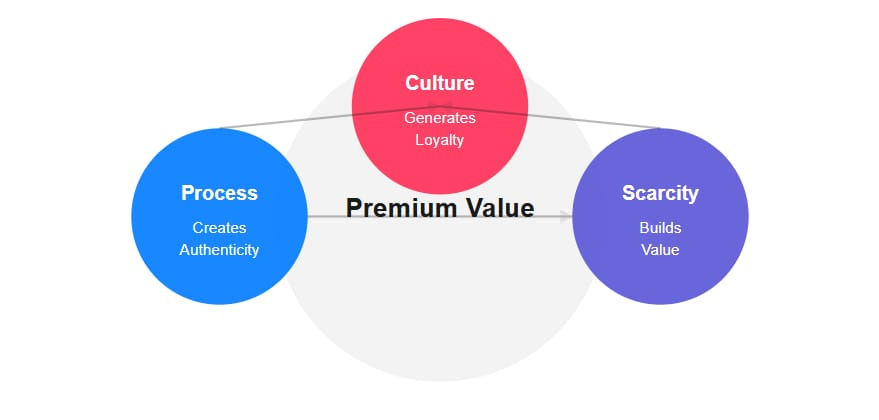
The result? A premium brand that grows through reduction rather than expansion.
Today, with over 150 global points of sale, Le Labo proves that rejecting industry conventions can create a stronger desire than following them. The key? As their manifesto states: "The soul of a fragrance comes from the intention with which it is created and the attention with which it is prepared."
C) Implementing the Anti-Marketing Marketing Framework
Several lessons can apply to your business in this story. I tried to categorize them with simple explanations. Of course not all will work for every business, but I believe there is something for every business.
Process as Premium Implementation
Design retail spaces like workshops, not stores
Train staff as artisans, not salespeople
Document production steps visually
Create signature rituals for key moments
Build educational content into an experience
Make craft visible at every touchpoint
Scarcity Implementation
Start with a single flagship location
Expand only to culturally aligned areas
Create location-specific products/experiences
Build waitlists naturally
Never discount
Limit wholesale/distribution
Cultural Implementation
Choose locations for cultural fit over foot traffic
Build relationships with local artists/creators
Create community spaces within stores
Document brand story through the process
Let customers discover you
Resist rapid expansion
From Local Workshop to Global Luxury
Le Labo's evolution from a single Nolita store to global acquisition provides key lessons in scaling premium brands:
Controlled Growth: Their first expansion was selective - only neighborhoods that matched their cultural ethos. No rush to scale, no compromise on experience. When lifestyle magazines discovered them, they refused traditional PR opportunities. When luxury hotels wanted partnerships, they maintained strict product control.
Preserving Premium: Post-Estée Lauder acquisition, they kept their anti-marketing stance. Still no advertising. Still no mass distribution. Still fresh blending in every location. Today, with 150+ points of sale, each store maintains the workshop aesthetic and artisanal approach.
The Results
$5M+ revenue without marketing spend
85% brand loyalty
Global recognition without mass exposure
Premium pricing power
Category influence
Key insight: They scaled the experience, not just the product. As stated in the beginning, "The future of luxury lies in craftsmanship." Each new location needed to feel like discovering that first Nolita workshop.
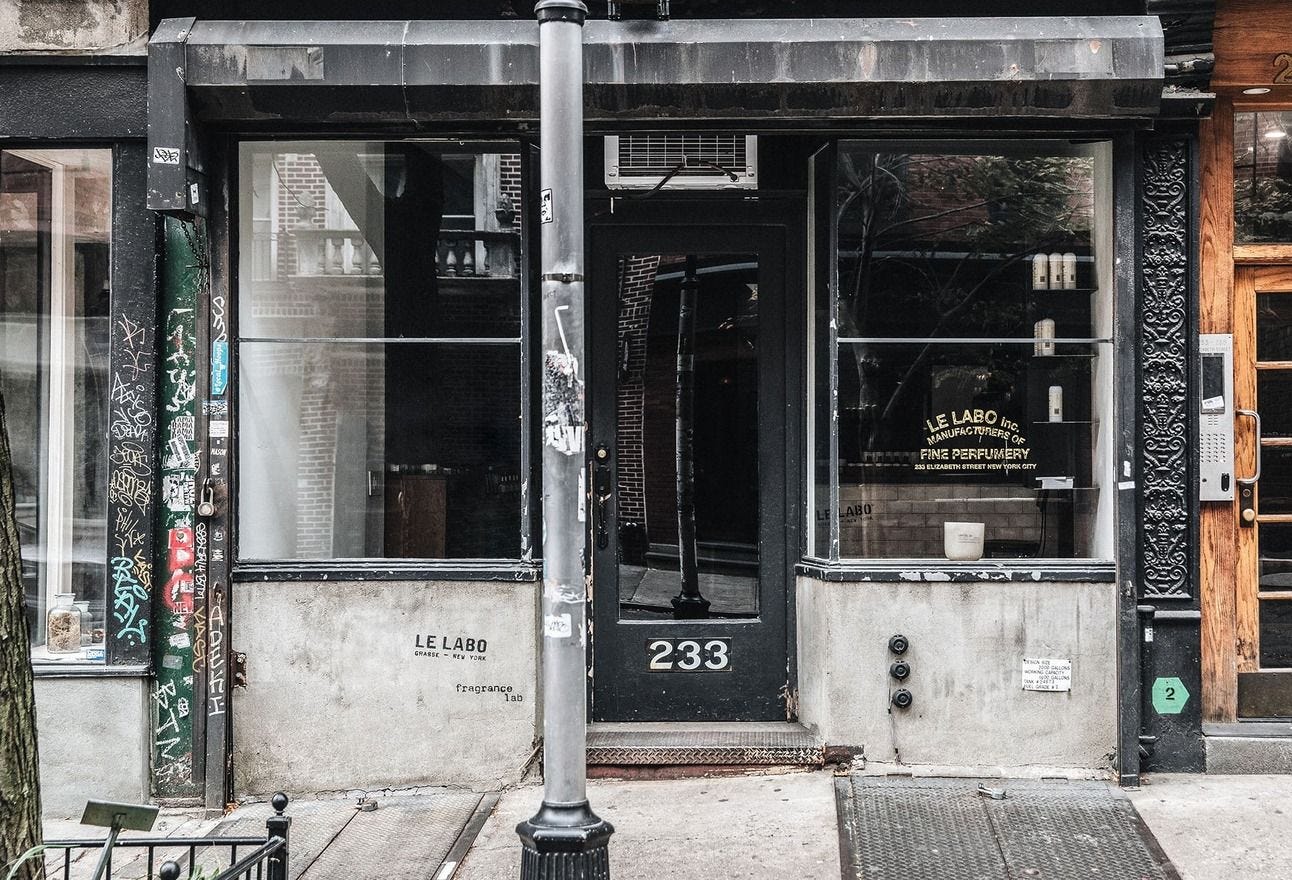
Conclusion
Le Labo's success isn’t just about making great perfumes. It is about understanding that in an era of mass luxury, authenticity becomes the ultimate premium. Their anti-marketing approach created more desire than traditional luxury marketing ever could.
The key lesson for premium brands: Sometimes the best way to build desire is to resist the conventional paths to growth.
They proved that:
The process can be more luxurious than packaging
Scarcity creates more value than availability
Cultural capital beats marketing capital
Anti-marketing can be the best marketing
For founders building premium brands today, Le Labo's story offers a powerful framework: Focus on the soul of your product, make your process your premium, and let authenticity drive your growth.
Today, as luxury becomes increasingly mass-market, Le Labo's anti-luxury revolution feels more relevant (and personal) than ever. Sometimes the best way to stand out is to break every rule in the playbook.
Thanks for reading,
BA
Fact-based news without bias awaits. Make 1440 your choice today.
Overwhelmed by biased news? Cut through the clutter and get straight facts with your daily 1440 digest. From politics to sports, join millions who start their day informed.




